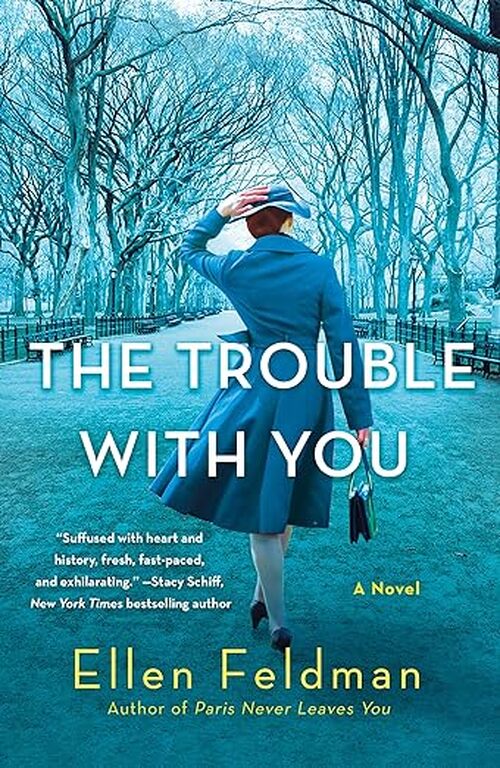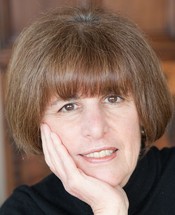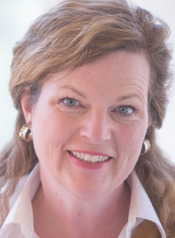Ellen Feldman is a 2009 Guggenheim Fellow, and the author of nine riveting and insightful works of historical fiction.
Ellen has been on my radar ever since I read her debut novel, LUCY, back in 2003. I was impressed even her even then but she seems to have gone from strength to strength ever since. Her latest book, THE TROUBLE WITH YOU, released on February 20th, is the work of writer at the top of her game.
I’m grateful to Ellen for taking the time to answer some questions about the book, and her writing life.
Q: Please introduce us to THE TROUBLE WITH YOU. What is the basic plot and premise, and where did you find your inspiration for the story?
A: THE TROUBLE WITH YOU is the story of Fanny Fabricant, a woman raised to be a wife and mother, who suddenly finds she is only half that description and must rear her small daughter and support both of them on her own.
The inspiration for the book was the fate of women, my mother’s generation, in the postwar world. During WWII, men went off to fight and women came out of the home to work in offices, factories, and at a variety of jobs formerly done by men. They womened assembly lines, ran government agencies, delivered newly built planes. After the war twelve million men came home, and the nation, fearing a rash of unemployment and a depression, sent the women home to their kitchens and bedrooms. Economic fears gave rise to social strictures. Women who had to work were pitied. Women who chose to work were demonized. Work that wasn’t household drudgery would rob a woman of her femineity, the “experts” said. The result was a society geared to reduce competent women to dependent children.
Q: IMHO, when it comes to dialogue, you’re in the very top tier of authors. Not a word is wasted and it feels like eavesdropping on a conversation between real people. Is this as easy as you make it look, an author playing into her strengths? Or do you have to work at it? In short, how do you pull it off?
A: I love writing dialogue. I wouldn’t say it comes to me easily. I do enormous amounts of rewriting of dialogue and every aspect of my books. But I find the give-and-take of a verbal exchange an incisive economic way to reveal character. What do people say? What do they mean? Are they hiding behind their words, trying to project a certain persona, whistling in the dark? And once characters start talking, I find it hard to shut them up. Perhaps because, as I’ve been told since I was a child, I talk a lot.
Q: I learned a lot about the radio dramas, blacklisting, and the rules and roles imposed upon women while reading THE TROUBLE WITH YOU is post-WW2. (Some of the dating etiquette for women made my jaw drop!) Tell us about your research process. Was there anything you discovered that surprised you?
A: Perhaps because I’d already done a lot of research of the period for other books or because remnants of the mores and mind set of that era lingered into my youth, I didn’t have to do as much research as I’ve had to for some other books, such as my novels about Margaret Sanger or the Scottsboro Boys. Nonetheless, there were still surprises.
I’d had experiences with sexism, but many of the magazine articles of the day for and about women raised my hackles. The misogynist quotations from a college president, a respected public figure, and other “experts” that begin the book were so outrageous I couldn’t help including them. There was, however, one curious aspect of my research, or perhaps only of my unconscious. Until Fanny landed her job in radio soaps, I had forgotten that in my youth I’d got a “scholarship” to “soap school,” an experience which I write about in a piece for Lit Hub.
Q: I fell love with Fanny Fabricant is the main character of your book, early on – she’s smart (as well as a bit of a smart-aleck, which I adore!) But you’ve also got a compelling cast of secondary characters. Is there one in particular who earned a special place in your heart?
A: Rose, Fanny’s aunt, is one of my favorite characters of all those I’ve created. In some ways she’s the woman I want to be, the aunt (I have a passel of nieces and nephews) I tried to be. I didn’t make it – I’m not as feisty and fearless – but fortunately Rose did.
My other favorite character is Charlie. One of my early readers told me she was rooting for Fanny to sleep with Charlie. When I repeated the comment to another early reader, she said, “Are you kidding? We all want to sleep with Charlie.” I hope that turns out to be true.
Q: What are three elements you think are essential to crafting great women’s fiction?
A: May I be difficult here? I don’t like to think of women’s fiction. Or for that matter historical fiction. I believe in fiction. And for me, as for Henry James and countless writers through the ages, it’s character, character, character. If readers don’t engage with the characters, love or hate them, root or fear for them, they won’t care about the story. And for me as a writer, the most perceptive and persuasive stories or plots grow out of character. As Fanny learns in the book, action never rings true unless motivation is believable.
Q: Where does the book idea start for you? With a character? A problem? A place? Something else?
A: Different books have different inspirations, but in a way it’s always character, again. Even when I explore the issues and events that obsess me – misogyny, the blacklist, survivor guilt – I do it through fictional characters who might be involved as perpetrators, victims, or witnesses – Fanny here; Charlotte in Paris Never Leaves You; Millie in The Living and the Lost. And when I write about real historical characters – Lucy in LUCY, Margaret Sanger in Terrible Virtue – I’m aware that they’re my Lucy and my Margaret Sanger.
Q: What’s a book you didn’t write but wish you had?
A: I’m afraid I wish I’d written just about every book I’ve fallen in love with. I’m a green-eyed monster when it comes to literature. Elizabeth Jane Howard’s entire Cazelet Chronicles; Mrs. Palfrey at the Claremont by Elizabeth Taylor and just about all her novels; Women in Black by Madeline St. John; all of Lisa Evans’ books; The Heaven and Earth Grocery Store by William McBride; Binocular Vision by Edith Pearlman; The Group by Mary McCarthy; and in nonfiction, all of Stacy Schiff’s books, but especially Vera and The Revolutionary.
Q: Though THE TROUBLE WITH YOU is set in post WW2 New York, the plot and themes feel relevant to a modern audience. What do you want people to take away from the book?
A: My aspiration is that readers of this or any book I write have a good time reading it. I want them to get lost in the story and care about the characters. That said, while the customs, mores, and events Fanny has to navigate are light years away, they are in many ways as relevant as this morning’s headlines.
I hope readers make the connection between the blacklist and today’s book censorship, between the postwar repression of women and the current threat to women’s rights, between the injustices of that era and today’s inequality and discrimination. I also hope the struggles of my characters inspire similar courage in current readers. I don’t know that books change people, but I believe they can embolden them.
Q: What are you working on next? When can we read it?
A: I’m currently working on a novel that begins in 1963 and goes up to the present or at least 2022. It’s the story of a young woman and her two close friends whose private lives are shaped by the tumultuous public events of the day in which they’re passionately involved.
I realize that description isn’t very specific, but I’m still auditioning characters and if they make the cut, waiting to see what they’ll decide to do. Unruly individuals with ideas of their own are my favorite characters. I hope to finish it in the next six months, but then these three girls who grow into women may have other plans.
THE TROUBLE WITH YOU by Ellen Feldman
In an exuberant post WWII New York City, a young woman is forced to reinvent her life and choose between the safe and the ethical, and the men who represent each…
Set in New York City in the heady aftermath of World War II when the men were coming home, the women were exhaling in relief, and everyone was having babies, The Trouble With You is the story of a young woman whose rosy future is upended in a single instant. Raised never to step out of bounds, educated in one of the Sister Seven Colleges for a career as a wife and mother, torn between her cousin Mimi who is determined to keep her a “nice girl”—the kind that marries a doctor—and her aunt Rose who has a rebellious past of her own, Fanny struggles to raise her young daughter and forge a new life by sheer will and pluck. When she gets a job as a secretary to the “queen” of radio serials—never to be referred to as soaps—she discovers she likes working, and through her friendship with an actress who stars in the series and a man who writes them, comes face to face with the blacklist which is destroying careers and wrecking lives. Ultimately, Fanny must decide between playing it safe or doing what she knows is right in this vivid evocation of a world that seems at once light years away and strangely immediate.
Historical [St. Martin’s Griffin, On Sale: February 20, 2024, Trade Paperback / e-Book, ISBN: 9781250879462 / eISBN: 9781250879486]
Buy THE TROUBLE WITH YOU: Amazon.com | Kindle | BN.com | Apple Books | Kobo | Google Play | Powell’s Books | Books-A-Million | Indie BookShops | Ripped Bodice | Walmart.com | Target.com | Amazon CA | Amazon UK | Amazon DE | Amazon FR
About Ellen Feldman
Ellen Feldman, a 2009 Guggenheim fellow, is the author of Terrible Virtue, The Unwitting, Next to Love, Scottsboro (shortlisted for the Orange Prize), The Boy Who Loved Anne Frank (translated into nine languages), and Lucy. Her last novel, Terrible Virtue, was optioned by Black Bicycle for a feature film. Her new novel, Paris Never Leaves You, is this summer.
Ellen has lectured extensively around the country and in Germany and England, and enjoys talking to book groups in person, on the phone, or via the web.
She grew up in northern New Jersey and attended Bryn Mawr College, from which she holds a B.A. and an M.A. in modern history. After further graduate studies at Columbia University, she worked for a New York publishing house.
Ellen lives in New York City and East Hampton, New York, with her husband and a terrier named Charlie.
WEBSITE |
About Marie Bostwick
When not curled up with a good book, Marie Bostwick can usually be found in her office, trying to write one.
A New York Times and USA Today bestselling author of eighteen uplifting works of historical and contemporary fiction, Marie’s books are beloved by readers across the globe.
Drawing on her lifelong love of quilting and her unshakable belief in the power of sisterhood, Marie’s popular Cobbled Court Quilt series has been embraced by quilters and non-sewers alike. Her standalone books have also found a passionate following among lovers of women’s fiction. Marie’s novel, The Second Sister” was adapted into the 2018 Hallmark Hall of Fame feature film “Christmas Everlasting”, starring Patti LaBelle. Marie’s most recent novel, Hope on the Inside, was published in March 2019 and was chosen as a Reader’s Digest “Select Editions” book.
Marie’s latest endeavor is Fiercely Marie, a lifestyle blog that encourages women to live every minute and love every moment. She is currently working on her next novel, “The Restoration of Celia Fairchild”, which will be published by William Morrow in the spring of 2021.
Marie lives in Washington state with her husband and a beautiful but moderately spoiled Cavalier King Charles Spaniel.





No Comments
Comments are closed.